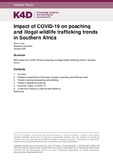Impact of COVID-19 on Poaching and Illegal Wildlife Trafficking Trends in Southern Africa
Abstract
This rapid review focuses on the impact COVID-19 pandemic om poaching and illegal wildlife trafficking. It provides an overview of the recent research and summarises the key themes.
This review found that poaching for the purpose of international trafficking of illegal wildlife products, generally decreased. These declines are largely attributed to the disruption of transportation routes used by wildlife traffickers to move illicit goods within Southern Africa and overseas by air, and in some locations to the effects of local lockdown measures.
Poaching for subsistence consumption (bushmeat) generally increased across Southern Africa and worldwide during the COVID-19 pandemic, incentivised largely by economic hardship and opportunities presented by a reduction in the capacity for anti-poaching enforcement and reduced numbers of tourists, whose presence tends to deter poachers.
In the long term, poaching and trafficking are likely to return to pre-pandemic levels. Commercial poachers and traffickers are likely to adjust their transportation routes and adapt their business models to take advantage of opportunities. More positively, some authors have suggested the possibility that the COVID-19 pandemic could influence public attitudes against wildlife trafficking and in support of conservation.
Trends in poaching and illegal wildlife trafficking during the COVID-19 pandemic vary significantly across and within countries. The impacts resulting from the measures put in place to reduce the spread of COVID-19 have varied significantly depending on local contexts.
Up-to-date data on recent trends during the pandemic are scarce. Good quality data are available on poaching and trafficking of high-value commodities such as elephant ivory and rhino horn, while data on poaching for subsistence are less rigorous and often anecdotal. Much of the evidence available for both types of poaching is not systematic and comes from news media reports, and suffers from inherent difficulties of collecting data on illegal activities. Data collection during the pandemic has also been hampered by the challenges of working safely during the pandemic, funding for monitoring and research has been reduced in most areas, and some reporting processes have not yet analysed data collected during 2021.
Citation
Lucas, B. (2022). Impact of COVID-19 on poaching and illegal wildlife trafficking trends in Southern Africa. K4D Helpdesk Report 1094. Institute of Development Studies. DOI: 10.19088/K4D.2022.017DOI
10.19088/K4D.2022.017Is part of series
K4D Helpdesk Report;1094Rights holder
© Crown copyright 2022Sponsor
FCDO (Foreign, Commonwealth and Development Office)Collections
- K4D COVID-19 Resources [213]

